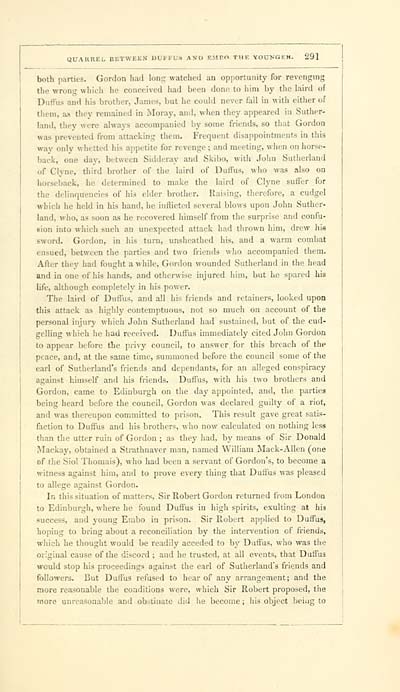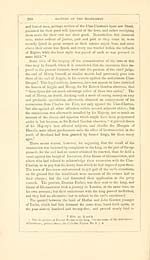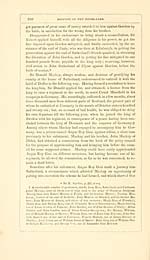Download files
Complete book:
Individual page:
Thumbnail gallery: Grid view | List view

UUAHREL BETWEKN DUFFUS AND EMP.O THE YOOVGEK. 291
both panics. Gordon had long watched an opportunity for revenging
the wrong which he conceived had been done: to him by the laird of
Dnffus and his brother, James, but he coulil never liill in with either of
them, as they remained in Moray, and, when they appeared in Suther-
land, tliey were always accompanied by some friends, so that Gordon
was prevented from attacking them. Frequent disappointments in this
way only whetted his appetite for revenge ; and meeting, wlien on horse-
back, one day, between Sidderay and Skibo, with John Sutiierlaiui
of Clyne, third brother of the laird of Duffus, who was also on
horseback, he determined to make the laird of Clyne suffer for
the delinquencies of Iiis elder brotiier. Raising, therefore, a cudgel
which he held in his hand, he inflicted several blows upon John Suther-
land, who, as soon as he recovered himself from the surprise and confu-
sion into which such an unexpected attack had thrown him, drew his
sword. Gordon, in his turn, unsheathed his, and a warm combat
ensued, between the parties and two iriends who accompanied them.
After they iiad fought a while, Gordon wounded Sutherland in the head
and in one of his hands, and otherwise injured him, but he spared his
life, although completely in his power.
Tlie laird of Dulfus, and all his friends and retainers, looked upon
this attack as highly contemptuous, not so much on account of the
personal injury which John Sutherland had sustained, but of the cud-
gelling which he had received. DufTus immediately cited John Gordon
to appear before the privy council, to answer for this breach of the
peace, and, at the same time, summoned before the council some of the
earl of Sutherland's friends and dependants, for an alleged conspiracy
against himself and his friends. Duff'us, with his two brothers and
Gordon, came to Edinburgh on tlie day appointed, and, the parties
being heard before the council, Gordon was declared gudty of a riot,
and was thereupon committed to prison. This result gave great satis-
faction to Duffus and his brothers, who now calculated on nothing less
than the utter ruin of Gordon ; as they had, by means of Sir Donald
Mackay, obtained a Strathnaver man, named William Mack-Allen (one
Df the Siol Thoraais), who had been a servant of Gordon's, to becoine a
witness against him, and to prove every thing that Duffus was pleased
to allege against Gordon.
In this situation of matters. Sir Robert Gordon returned from London
to Edinburgh, where he found Duffus in high spirits, exulting at his
success, and young Erabo in prison. Sir Robert applied to Duffus,
hoping to bring about a reconciliation by the intervention of friends,
which he thought would be readily acceded to by Duffus, who was the
or:ginal cause of the discord ; and he trusted, at all events, that Duffus
would stop his proceedings against the earl of Sutherland's friends and
followers. But Duffus refused to hear of any arrangement; and the
more reasonable the conditions were, which Sir Robert proposed, the
more unreasonable and obstinate did he become ; his object being to
both panics. Gordon had long watched an opportunity for revenging
the wrong which he conceived had been done: to him by the laird of
Dnffus and his brother, James, but he coulil never liill in with either of
them, as they remained in Moray, and, when they appeared in Suther-
land, tliey were always accompanied by some friends, so that Gordon
was prevented from attacking them. Frequent disappointments in this
way only whetted his appetite for revenge ; and meeting, wlien on horse-
back, one day, between Sidderay and Skibo, with John Sutiierlaiui
of Clyne, third brother of the laird of Duffus, who was also on
horseback, he determined to make the laird of Clyne suffer for
the delinquencies of Iiis elder brotiier. Raising, therefore, a cudgel
which he held in his hand, he inflicted several blows upon John Suther-
land, who, as soon as he recovered himself from the surprise and confu-
sion into which such an unexpected attack had thrown him, drew his
sword. Gordon, in his turn, unsheathed his, and a warm combat
ensued, between the parties and two iriends who accompanied them.
After they iiad fought a while, Gordon wounded Sutherland in the head
and in one of his hands, and otherwise injured him, but he spared his
life, although completely in his power.
Tlie laird of Dulfus, and all his friends and retainers, looked upon
this attack as highly contemptuous, not so much on account of the
personal injury which John Sutherland had sustained, but of the cud-
gelling which he had received. DufTus immediately cited John Gordon
to appear before the privy council, to answer for this breach of the
peace, and, at the same time, summoned before the council some of the
earl of Sutherland's friends and dependants, for an alleged conspiracy
against himself and his friends. Duff'us, with his two brothers and
Gordon, came to Edinburgh on tlie day appointed, and, the parties
being heard before the council, Gordon was declared gudty of a riot,
and was thereupon committed to prison. This result gave great satis-
faction to Duffus and his brothers, who now calculated on nothing less
than the utter ruin of Gordon ; as they had, by means of Sir Donald
Mackay, obtained a Strathnaver man, named William Mack-Allen (one
Df the Siol Thoraais), who had been a servant of Gordon's, to becoine a
witness against him, and to prove every thing that Duffus was pleased
to allege against Gordon.
In this situation of matters. Sir Robert Gordon returned from London
to Edinburgh, where he found Duffus in high spirits, exulting at his
success, and young Erabo in prison. Sir Robert applied to Duffus,
hoping to bring about a reconciliation by the intervention of friends,
which he thought would be readily acceded to by Duffus, who was the
or:ginal cause of the discord ; and he trusted, at all events, that Duffus
would stop his proceedings against the earl of Sutherland's friends and
followers. But Duffus refused to hear of any arrangement; and the
more reasonable the conditions were, which Sir Robert proposed, the
more unreasonable and obstinate did he become ; his object being to
Set display mode to: Large image | Transcription
Images and transcriptions on this page, including medium image downloads, may be used under the Creative Commons Attribution 4.0 International Licence unless otherwise stated. ![]()
| Early Gaelic Book Collections > Ossian Collection > History of the Highlands and of the Highland clans > Volume 1 > (405) |
|---|
| Permanent URL | https://digital.nls.uk/79677457 |
|---|
| Description | Vol. I. |
|---|---|
| Shelfmark | Oss.247 |
| Additional NLS resources: | |
| Attribution and copyright: |
|
| Description | Selected books from the Ossian Collection of 327 volumes, originally assembled by J. Norman Methven of Perth. Different editions and translations of James MacPherson's epic poem 'Ossian', some with a map of the 'Kingdom of Connor'. Also secondary material relating to Ossianic poetry and the Ossian controversy. |
|---|
| Description | Selected items from five 'Special and Named Printed Collections'. Includes books in Gaelic and other Celtic languages, works about the Gaels, their languages, literature, culture and history. |
|---|

